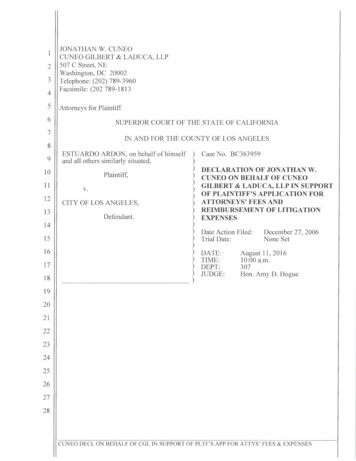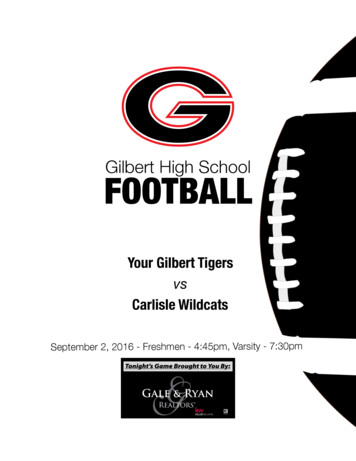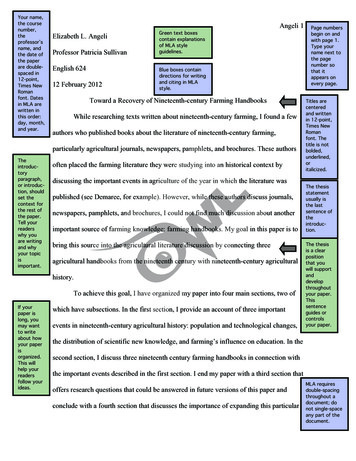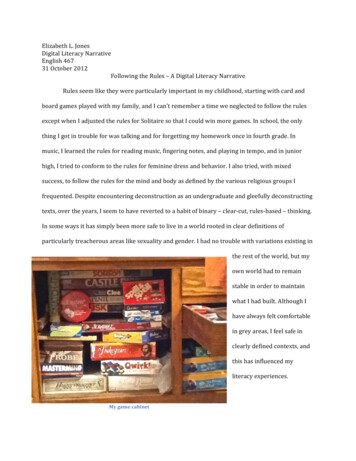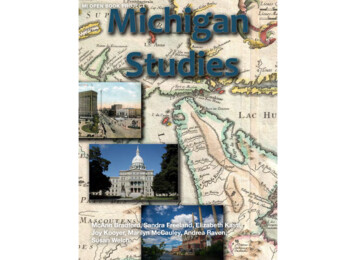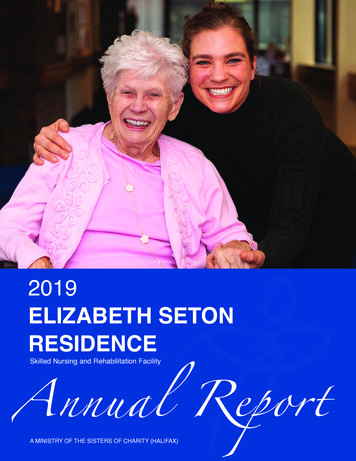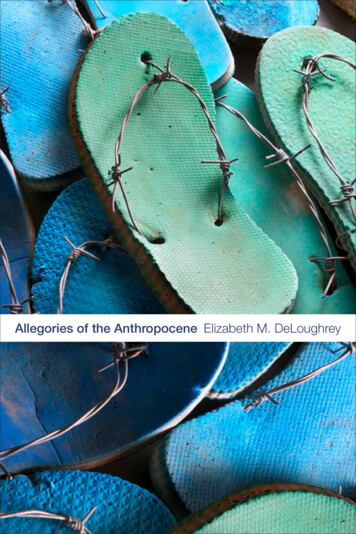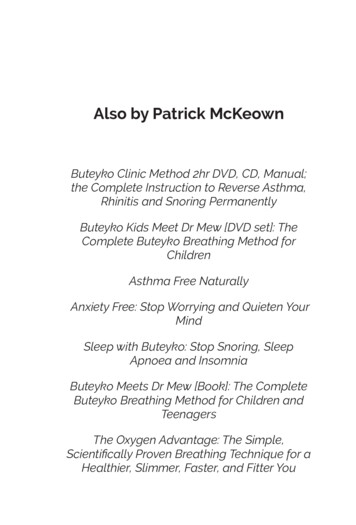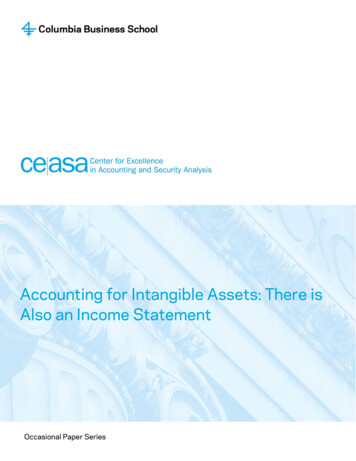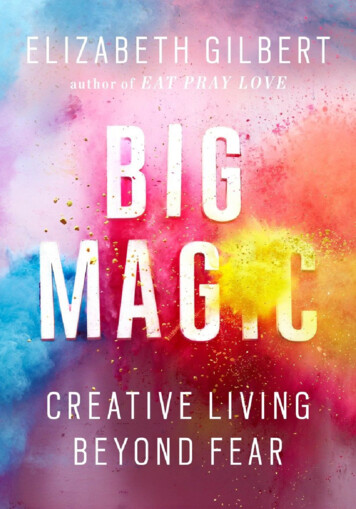
Transcription
Also by Elizabeth GilbertPilgrimsStern MenThe Last American ManEat Pray LoveCommitted: A Love StoryAt Home on the Range, by MargaretYardley PotterThe Signature of All Things
RIVERHEAD BOOKSAn imprint of Penguin Random House LLC375 Hudson StreetNew York, New York 10014Copyright 2015 by Elizabeth GilbertPenguin supports copyright. Copyright fuelscreativity, encourages diverse voices, promotesfree speech, and creates a vibrant culture.Thank you for buying an authorized edition ofthis book and for complying with copyright lawsby not reproducing, scanning, or distributing anypart of it in any form without permission. Youare supporting writers and allowing Penguin tocontinue to publish books for every reader.Lines from “The Self-slaved” by PatrickKavanagh are reprinted from:Collected Poems, edited by Antoinette Quinn(Allen Lane, 2004), by kind permission of the
Trustees of the Estate of the late Katherine B.Kavanagh, through the Jonathan WilliamsLiterary Agency.Selected Poems (Penguin Classics, 1996, 2000).Copyright 1929, 1930, 1935, 1937, 1938, 1940,1941, 1942, 1943, 1944, 1945, 1946, 1947, 1948,1949, 1950, 1951, 1952, 1953, 1954, 1955, 1956,by Patrick Kavanagh; copyright by PatrickKavanagh, 1958, 1959, 1960, 1961, 1962, 1963,1964, 1965; copyright Katherine B.Kavanagh, 1972, 1978. Reproduced bypermission of Penguin Books Ltd.Library of Congress Cataloging-in-PublicationDataGilbert, Elizabeth, date.Big magic : creative living beyond fear /Elizabeth Gilbert.p. cm.ISBN 978-0-698-40831-91. Creative ability. 2. Inspiration. 3. Magical
thinking. 4. Confidence. 5. Courage. 6.Conduct of life. I. Title.BF408.G464 2015 2015010717153.3'5—dc23Version 1
This one’s for you, Rayya
Q: What is creativity?A: The relationship between ahuman being and themysteries of inspiration.
ContentsTitle PageCopyrightDedicationEpigraphPART ICouragePART IIEnchantment
PART IIIPermissionPART IVPersistencePART VTrustPART VIDivinityAcknowledgments
Courage
Hidden TreasureOnce upon a time, there was aman named Jack Gilbert,who was not related to me—unfortunately for me.Jack Gilbert was a great poet,but if you’ve never heard of him,don’t worry about it. It’s not yourfault. He never much cared aboutbeing known. But I knew about him,and I loved him dearly from arespectful distance, so let me tellyou about him.Jack Gilbert was born in
Pittsburgh in 1925 and grew up inthe midst of that city’s smoke, noise,and industry. He worked infactories and steel mills as a youngman, but was called from an earlyage to write poetry. He answeredthe call without hesitation. Hebecame a poet the way other menbecome monks: as a devotionalpractice, as an act of love, and as alifelong commitment to the searchfor grace and transcendence. I thinkthis is probably a very good way tobecome a poet. Or to becomeanything, really, that calls to yourheart and brings you to life.Jack could’ve been famous, but
he wasn’t into it. He had the talentand the charisma for fame, but henever had the interest. His firstcollection, published in 1962, wonthe prestigious Yale Younger Poetsprize and was nominated for thePulitzer. What’s more, he won overaudiences as well as critics, whichis not an easy feat for a poet in themodern world. There wassomething about him that drewpeople in and kept them captivated.He was handsome, passionate, sexy,brilliant on stage. He was a magnetfor women and an idol for men. Hewas photographed for Vogue,looking gorgeous and romantic.
People were crazy about him. Hecould’ve been a rock star.Instead, he disappeared. Hedidn’t want to be distracted by toomuch commotion. Later in life hereported that he had found his fameboring—not because it wasimmoral or corrupting, but simplybecause it was exactly the samething every day. He was looking forsomething richer, more textured,more varied. So he dropped out. Hewent to live in Europe and stayedthere for twenty years. He lived fora while in Italy, a while inDenmark, but mostly he lived in ashepherd’s hut on a mountaintop in
Greece. There, he contemplated theeternal mysteries, watched the lightchange, and wrote his poems inprivate. He had his love stories, hisobstacles, his victories. He washappy. He got by somehow, makinga living here and there. He neededlittle. He allowed his name to beforgotten.After two decades, Jack Gilbertresurfaced and published anothercollection of poems. Again, theliterary world fell in love with him.Again, he could have been famous.Again, he disappeared—this timefor a decade. This would be hispattern always: isolation, followed
by the publication of somethingsublime, followed by moreisolation. He was like a rareorchid, with blooms separated bymany years. He never promotedhimself in the least. (In one of thefew interviews he ever gave,Gilbert was asked how he thoughthis detachment from the publishingworld had affected his career. Helaughed and said, “I suppose it’sbeen fatal.”)The only reason I ever heard ofJack Gilbert was that, quite late inhis life, he returned to America and—for motives I will never know—took a temporary teaching position
in the creative writing department atthe University of Tennessee,Knoxville. The following year,2005, it happened that I took exactlythe same job. (Around campus, theystarted jokingly calling the position“the Gilbert Chair.”) I found JackGilbert’s books in my office—theoffice that had once been his. It wasalmost like the room was still warmfrom his presence. I read his poemsand was overcome by theirgrandeur, and by how much hiswriting reminded me of Whitman.(“We must risk delight,” he wrote.“We must have the stubbornness toaccept our gladness in the ruthless
furnace of this world.”)He and I had the same surname,we’d held the same job, we hadinhabited the same office, we hadtaught many of the same students,and now I was in love with hiswords; naturally enough, I becamedeeply curious about him. I askedaround: Who was Jack Gilbert?Students told me he was the mostextraordinary man they’d everencountered. He had seemed notquite of this world, they said. Heseemed to live in a state ofuninterrupted marvel, and heencouraged them to do the same. Hedidn’t so much teach them how to
write poetry, they said, but why:because of delight. Because ofstubborn gladness. He told them thatthey must live their most creativelives as a means of fighting backagainst the ruthless furnace of thisworld.Most of all, though, he asked hisstudents to be brave. Withoutbravery, he instructed, they wouldnever be able to realize the vaultingscope of their own capacities.Without bravery, they would neverknow the world as richly as it longsto be known. Without bravery, theirlives would remain small—farsmaller than they probably wanted
their lives to be.I never met Jack Gilbert myself,and now he is gone—he passedaway in 2012. I probably could’vemade it a personal mission to seekhim out and meet him while he wasliving, but I never really wanted to.(Experience has taught me to becareful of meeting my heroes inperson; it can be terriblydisappointing.) Anyway, I quiteliked the way he lived inside myimagination as a massive andpowerful presence, built out of hispoems and the stories I’d heardabout him. So I decided to knowhim only that way—through my
imagination. And that’s where heremains for me to this day: stillalive inside me, completelyinternalized, almost as though Idreamed him up.But I will never forget what thereal Jack Gilbert told somebodyelse—an actual flesh-and-bloodperson, a shy University ofTennessee student. This youngwoman recounted to me that oneafternoon, after his poetry class,Jack had taken her aside. Hecomplimented her work, then askedwhat she wanted to do with her life.Hesitantly, she admitted thatperhaps she wanted to be a writer.
He smiled at the girl withinfinite compassion and asked, “Doyou have the courage? Do you havethe courage to bring forth thiswork? The treasures that are hiddeninside you are hoping you will sayyes.”Creative Living,DefinedSo this, I believe, is the centralquestion upon which allcreative living hinges: Do you havethe courage to bring forth the
treasures that are hidden withinyou?Look, I don’t know what’shidden within you. I have no way ofknowing such a thing. You yourselfmay barely know, although I suspectyou’ve caught glimpses. I don’tknow your capacities, youraspirations, your longings, yoursecret talents. But surely somethingwonderful is sheltered inside you. Isay this with all confidence,because I happen to believe we areall walking repositories of buriedtreasure. I believe this is one of theoldest and most generous tricks theuniverse plays on us human beings,
both for its own amusement and forours: The universe buries strangejewels deep within us all, and thenstands back to see if we can findthem.The hunt to uncover those jewels—that’s creative living.The courage to go on that hunt inthe first place—that’s whatseparates a mundane existence froma more enchanted one.The often surprising results ofthat hunt—that’s what I call BigMagic.An Amplified
ExistenceWhen I talk about “creativeliving” here, pleaseunderstand that I am not necessarilytalking about pursuing a life that isprofessionally or exclusivelydevoted to the arts. I’m not sayingthat you must become a poet wholives on a mountaintop in Greece,or that you must perform atCarnegie Hall, or that you must winthe Palme d’Or at the Cannes FilmFestival. (Though if you want toattempt any of these feats, by allmeans, have at it. I love watching
people swing for the bleachers.)No, when I refer to “creativeliving,” I am speaking morebroadly. I’m talking about living alife that is driven more strongly bycuriosity than by fear.One of the coolest examples ofcreative living that I’ve seen inrecent years, for instance, camefrom my friend Susan, who took upfigure skating when she was fortyyears old. To be more precise, sheactually already knew how to skate.She had competed in figure skatingas a child and had always loved it,but she’d quit the sport duringadolescence when it became clear
she didn’t have quite enough talentto be a champion. (Ah, lovelyadolescence—when the “talented”are officially shunted off from theherd, thus putting the total burden ofsociety’s creative dreams on thethin shoulders of a few select souls,while condemning everyone else tolive a more commonplace,inspiration-free existence! What asystem . . . )For the next quarter of a century,my friend Susan did not skate. Whybother, if you can’t be the best?Then she turned forty. She waslistless. She was restless. She feltdrab and heavy. She did a little
soul-searching, the way one does onthe big birthdays. She asked herselfwhen was the last time she’d felttruly light, joyous, and—yes—creative in her own skin. To hershock, she realized that it had beendecades since she’d felt that way. Infact, the last time she’d experiencedsuch feelings had been as ateenager, back when she was stillfigure skating. She was appalled todiscover that she had denied herselfthis life-affirming pursuit for solong, and she was curious to see ifshe still loved it.So she followed her curiosity.She bought a pair of skates, found a
rink, hired a coach. She ignored thevoice within her that told her shewas being self-indulgent andpreposterous to do this crazy thing.She tamped down her feelings ofextreme self-consciousness at beingthe only middle-aged woman on theice, with all those tiny, featherynine-year-old girls.She just did it.Three mornings a week, Susanawoke before dawn and, in thatgroggy hour before her demandingday job began, she skated. And sheskated and skated and skated. Andyes, she loved it, as much as ever.She loved it even more than ever,
perhaps, because now, as an adult,she finally had the perspective toappreciate the value of her own joy.Skating made her feel alive andageless. She stopped feeling likeshe was nothing more than aconsumer, nothing more than thesum of her daily obligations andduties. She was making somethingof herself, making something withherself.It was a revolution. A literalrevolution, as she spun to life againon the ice—revolution uponrevolution upon revolution . . .Please note that my friend didnot quit her job, did not sell her
home, did not sever all herrelationships and move to Torontoto study seventy hours a week withan exacting Olympic-level skatingcoach. And no, this story does notend with her winning anychampionship medals. It doesn’thave to. In fact, this story does notend at all, because Susan is stillfigure skating several mornings aweek—simply because skating isstill the best way for her to unfold acertain beauty and transcendencewithin her life that she cannot seemto access in any other manner. Andshe would like to spend as muchtime as possible in such a state of
transcendence while she is stillhere on earth.That’s all.That’s what I call creativeliving.And while the paths andoutcomes of creative living willvary wildly from person to person,I can guarantee you this: A creativelife is an amplified life. It’s abigger life, a happier life, anexpanded life, and a hell of a lotmore interesting life. Living in thismanner—continually and stubbornlybringing forth the jewels that arehidden within you—is a fine art, inand of itself.
Because creative living is whereBig Magic will always abide.Scary, Scary,ScaryLet’s talk about courage now.If you already have thecourage to bring forth the jewelsthat are hidden within you, terrific.You’re probably already doingreally interesting things with yourlife, and you don’t need this book.Rock on.But if you don’t have the
courage, let’s try to get you some.Because creative living is a path forthe brave. We all know this. Andwe all know that when couragedies, creativity dies with it. We allknow that fear is a desolateboneyard where our dreams go todesiccate in the hot sun. This iscommon knowledge; sometimes wejust don’t know what to do about it.Let me list for you some of themany ways in which you might beafraid to live a more creative life:You’re afraid you have notalent.You’re afraid you’ll be
rejected or criticized orridiculed ormisunderstood or—worstof all—ignored.You’re afraid there’s nomarket for yourcreativity, and thereforeno point in pursuing it.You’re afraid somebody elsealready did it better.You’re afraid everybody elsealready did it better.You’re afraid somebody willsteal your ideas, so it’ssafer to keep them hiddenforever in the dark.You’re afraid you won’t be
taken seriously.You’re afraid your work isn’tpolitically, emotionally,or artistically importantenough to changeanyone’s life.You’re afraid your dreamsare embarrassing.You’re afraid that somedayyou’ll look back on yourcreative endeavors ashaving been a giantwaste of time, effort, andmoney.You’re afraid you don’t havethe right kind ofdiscipline.
You’re afraid you don’t havethe right kind of workspace, or financialfreedom, or empty hoursin which to focus oninvention or exploration.You’re afraid you don’t havethe right kind of trainingor degree.You’re afraid you’re too fat.(I don’t know what thishas to do with creativity,exactly, but experiencehas taught me that mostof us are afraid we’re toofat, so let’s just put thaton the anxiety list, for
good measure.)You’re afraid of beingexposed as a hack, or afool, or a dilettante, or anarcissist.You’re afraid of upsettingyour family with whatyou may reveal.You’re afraid of what yourpeers and coworkers willsay if you express yourpersonal truth aloud.You’re afraid of unleashingyour innermost demons,and you really don’t wantto encounter yourinnermost demons.
You’re afraid your best workis behind you.You’re afraid you never hadany best work to beginwith.You’re afraid you neglectedyour creativity for solong that now you cannever get it back.You’re afraid you’re too oldto start.You’re afraid you’re tooyoung to start.You’re afraid becausesomething went well inyour life once, soobviously nothing can
ever go well again.You’re afraid becausenothing has ever gonewell in your life, so whybother trying?You’re afraid of being a onehit wonder.You’re afraid of being a nohit wonder . . .Listen, I don’t have all day here,so I’m not going to keep listingfears. It’s a bottomless list, anyhow,and a depressing one. I’ll just wrapup my summary this way: SCARY,SCARY, SCARY.Everything is so goddamn scary.
Defending YourWeaknessPlease understand that the onlyreason I can speak soauthoritatively about fear is that Iknow it so intimately. I know everyinch of fear, from head to toe. I’vebeen a frightened person my entirelife. I was born terrified. I’m notexaggerating; you can ask anyone inmy family, and they’ll confirm that,yes, I was an exceptionally freakedout child. My earliest memories areof fear, as are pretty much all thememories that come after my
earliest memories.Growing up, I was afraid notonly of all the commonlyrecognized and legitimatechildhood dangers (the dark,strangers, the deep end of theswimming pool), but I was alsoafraid of an extensive list ofcompletely benign things (snow,perfectly nice babysitters, cars,playgrounds, stairs, Sesame Street,the telephone, board games, thegrocery store, sharp blades ofgrass, any new situationwhatsoever, anything that dared tomove, etc., etc., etc.).I was a sensitive and easily
traumatized creature who wouldfall into fits of weeping at anydisturbance in her force field. Myfather, exasperated, used to call mePitiful Pearl. We went to theDelaware shore one summer when Iwas eight years old, and the oceanupset me so much that I tried to getmy parents to stop all the people onthe beach from going into the surf.(I just would’ve felt a lot morecomfortable if everyone had stayedsafely on his or her own towel,quietly reading; was that too muchto ask?) If I’d had my way, I wouldhave spent that entire vacation—indeed, my entire childhood—
indoors, snuggled on my mother’slap, in low light, preferably with acool washcloth on my forehead.This is a horrible thing to say,but here goes: I probably would’veloved having one of those awfulMunchausen-syndrome-by-proxymothers, who could have colludedwith me in pretending that I waseternally sick, weak, and dying. Iwould have totally cooperated withthat kind of mother in creating acompletely helpless child, givenhalf the chance.But I didn’t get that kind ofmother.Not even close.
Instead, I got a mother whowasn’t having it. She wasn’t havinga minute of my drama, which isprobably the luckiest thing that everhappened to me. My mom grew upon a farm in Minnesota, the proudproduct of tough Scandinavianimmigrants, and she was not aboutto raise a little candy-ass. Not onher watch. My mother had a planfor turning around my fear that wasalmost comic in itsstraightforwardness: At every turn,she made me do exactly what Idreaded most.Scared of the ocean? Get inthat ocean!
Afraid of the snow? Time to goshovel snow!Can’t answer the telephone?You are now officially in charge ofanswering the telephone in thishouse!Hers was not a sophisticatedstrategy, but it was consistent. Trustme, I resisted her. I cried andsulked and deliberately failed. Irefused to thrive. I lagged behind,limping and trembling. I would doalmost anything to prove that I wasemotionally and physically totallyenfeebled.To which my mom was, like,“No, you aren’t.”
I spent years pushing backagainst my mother’s unshakablefaith in my strength and abilities.Then one day, somewhere inadolescence, I finally realized thatthis was a really weird battle forme to be fighting. Defending myweakness? That’s seriously the hillI wanted to die on?As the saying goes: “Argue foryour limitations and you get to keepthem.”Why would I want to keep mylimitations?I didn’t, as it turned out.I don’t want you keeping yours,either.
Fear Is BoringOver the years, I’ve oftenwondered what finally mademe stop playing the role of PitifulPearl, almost overnight. Surelythere were many factors involved inthat evolution (the tough-momfactor, the growing-up factor), butmostly I think it was just this: Ifinally realized that my fear wasboring.Mind you, my fear had alwaysbeen boring to everybody else, butit wasn’t until mid-adolescence thatit became, at last, boring even to
me. My fear became boring to me, Ibelieve, for the same reason thatfame became boring to JackGilbert: because it was the samething every day.Around the age of fifteen, Isomehow figured out that my fearhad no variety to it, no depth, nosubstance, no texture. I noticed thatmy fear never changed, neverdelighted, never offered a surprisetwist or an unexpected ending. Myfear was a song with only one note—only one word, actually—andthat word was “STOP!” My fearnever had anything more interestingor subtle to offer than that one
emphatic word, repeated at fullvolume on an endless loop: “STOP,STOP, STOP, STOP!”Which means that my fearalways made predictably boringdecisions, like a choose-your-ownending book that always had thesame ending: nothingness.I also realized that my fear wasboring because it was identical toeveryone else’s fear. I figured outthat everyone’s song of fear hasexactly that same tedious lyric:“STOP, STOP, STOP, STOP!”True, the volume may vary fromperson to person, but the song itselfnever changes, because all of us
humans were equipped with thesame basic fear package when wewere being knitted in our mothers’wombs. And not just humans: If youpass your hand over a petri dishcontaining a tadpole, the tadpolewill flinch beneath your shadow.That tadpole cannot write poetry,and it cannot sing, and it will neverknow love or jealousy or triumph,and it has a brain the size of apunctuation mark, but it damn sureknows how to be afraid of theunknown.Well, so do I.So do we all. But there’s nothingparticularly compelling about that.
Do you see what I mean? You don’tget any special credit, is what I’msaying, for knowing how to beafraid of the unknown. Fear is adeeply ancient instinct, in otherwords, and an evolutionarily vitalone . . . but it ain’t especially smart.For the entirety of my young andskittish life, I had fixated upon myfear as if it were the mostinteresting thing about me, whenactually it was the most mundane. Infact, my fear was probably the only100 percent mundane thing aboutme. I had creativity within me thatwas original; I had a personalitywithin me that was original; I had
dreams and perspectives andaspirations within me that wereoriginal. But my fear was notoriginal in the least. My fear wasn’tsome kind of rare artisanal object;it was just a mass-produced item,available on the shelves of anygeneric box store.And that’s the thing I wanted tobuild my entire identity around?The most boring instinct Ipossessed?The panic reflex of my dumbestinner tadpole?No.
The Fear YouNeed and the FearYou Don’t NeedNow you probably think I’mgoing to tell you that you mustbecome fearless in order to live amore creative life. But I’m notgoing to tell you that, because Idon’t happen to believe it’s true.Creativity is a path for the brave,yes, but it is not a path for thefearless, and it’s important torecognize the distinction.Bravery means doing something
scary.Fearlessness means not evenunderstanding what the word scarymeans.If your goal in life is to becomefearless, then I believe you’realready on the wrong path, becausethe only truly fearless people I’veever met were straight-upsociopaths and a few exceptionallyreckless three-year-olds—and thosearen’t good role models for anyone.The truth is, you need your fear,for obvious reasons of basicsurvival. Evolution did well toinstall a fear reflex within you,because if you didn’t have any fear,
you would lead a short, crazy,stupid life. You would walk intotraffic. You would drift off into thewoods and be eaten by bears. Youwould jump into giant waves off thecoast of Hawaii, despite being apoor swimmer. You would marry aguy who said on the first date, “Idon’t necessarily believe peoplewere designed by nature to bemonogamous.”So, yes, you absolutely do needyour fear, in order to protect youfrom actual dangers like the onesI’ve listed above.But you do not need your fearin the realm of creative expression.
Seriously, you don’t.Just because you don’t need yourfear when it comes to creativity, ofcourse, doesn’t mean your fearwon’t show up. Trust me, your fearwill always show up—especiallywhen you’re trying to be inventiveor innovative. Your fear willalways be triggered by yourcreativity, because creativity asksyou to enter into realms of uncertainoutcome, and fear hates uncertainoutcome. Your fear—programmedby evolution to be hypervigilant andinsanely overprotective—willalways assume that any uncertainoutcome is destined to end in a
bloody, horrible death. Basically,your fear is like a mall cop whothinks he’s a Navy SEAL: He hasn’tslept in days, he’s all hopped up onRed Bull, and he’s liable to shoot athis own shadow in an absurd effortto keep everyone “safe.”This is all totally natural andhuman.It’s absolutely nothing to beashamed of.It is, however, something thatvery much needs to be dealt with.The Road Trip
ere’s how I’ve learned to deal withmy fear: I made a decision along time ago that if I wantcreativity in my life—and I do—then I will have to make space forfear, too.Plenty of space.I decided that I would need tobuild an expansive enough interiorlife that my fear and my creativitycould peacefully coexist, since itappeared that they would always betogether. In fact, it seems to me thatmy fear and my creativity arebasically conjoined twins—asevidenced by the fact that creativitycannot take a single step forwardH
without fear marching rightalongside it. Fear and creativityshared a womb, they were born atthe same time, and they still sharesome vital organs. This is why wehave to be careful of how wehandle our fear—because I’venoticed that when people try to killoff their fear, they often end upinadvertently murdering theircreativity in the process.So I don’t try to kill off my fear.I don’t go to war against it. Instead,I make all that space for it. Heapsof space. Every single day. I’mmaking space for fear right thismoment. I allow my fear to live and
breathe and stretch out its legscomfortably. It seems to me that theless I fight my fear, the less it fightsback. If I can relax, fear relaxes,too. In fact, I cordially invite fear tocome along with me everywhere Igo. I even have a welcoming speechprepared for fear, which I deliverright before embarking upon anynew project or big adventure.It goes something like this:“Dearest Fear: Creativity and Iare about to go on a road triptogether. I understand you’ll bejoining us, because you always do. Iacknowledge that you believe youhave an important job to do in my
life, and that you take your jobseriously. Apparently your job is toinduce complete panic wheneverI’m about to do anything interesting—and, may I say, you are superb atyour job. So by all means, keepdoing your job, if you feel you must.But I will also be doing my job onthis road trip, which is to work hardand stay focused. And Creativitywill be doing its job, which is toremain stimulating and inspiring.There’s plenty of room in thisvehicle for all of us, so makeyourself at home, but understandthis: Creativity and I are the onlyones who will be making any
decisions along the way. Irecognize and respect that you arepart of this family, and so I willnever exclude you from ouractivities, but still—yoursuggestions will never be followed.You’re allowed to have a seat, andyou’re allowed to have a voice, butyou are not allowed to have a vote.You’re not allowed to touch theroad maps; you’re not allowed tosuggest detours; you’re not allowedto fiddle with the temperature.Dude, you’re not even allowed totouch the radio. But above all else,my dear old familiar friend, you areabsolutely forbidden to drive.”
Then we head off together—meand creativity and fear—side byside by side forever, advancingonce more into the terrifying butmarvelous terrain of unknownoutcome.Why It’s Worth ItIt isn’t always comfortable oreasy—carrying your fear aroundwith you on your great andambitious road trip, I mean—butit’s always worth it, because if youcan’t learn to travel comfortablyalongside your fear, then you’ll
never be able to go anywhereinteresting or do anythinginteresting.And that would be a pity,because your life is short and rareand amazing and miraculous, andyou want to do really interestingthings and make really interestingthings while you’re still here. Iknow that’s what you want foryourself, because that’s what I wantfor myself, too.It’s what we all want.And you have treasures hiddenwithin you—extraordinary treasures—and so do I, and so doeseveryone around us. And bringing
those treasures to light takes workand faith and focus and courage andhours of devotion, and the clock isticking, and the world is spinning,and we simply do not have timeanymore to think so small.
Enchantment
An Idea ArrivesNow that we’re done talkingabout fear, we can finally talkabout magic.Let me begin by telling you themost magical thing that’s everhappened to me.It’s about a book that I failed towrite.My tale begins in the earlyspring of 2006. I had recentlypublished Eat Pray Love, and I wastrying to figure out what to do withmyself next, creatively speaking.
My instincts told me it was time toreturn to my literary roots and writea work of fiction—something Ihadn’t done in years. In fact, Ihadn’t written a novel in so long, Ifeared I had forgotten how to do itat all. I feared that fiction hadbecome a language I could nolonger speak. But now I had an ideafor a novel—an idea that excitedme tremendously.The idea was based on a storythat my sweetheart, Felipe, had toldme one night about something thathad happened in Brazil, back whenhe was growing up there in the1960s. Apparently, the Brazilian
government got a notion to build agiant highway across the Amazonju
live a more commonplace, inspiration-free existence! What a system . . . ) For the next quarter of a century, my friend Susan did not skate. Why bother, if you can’t be the best? Then she turned forty. She was listless. Sh

